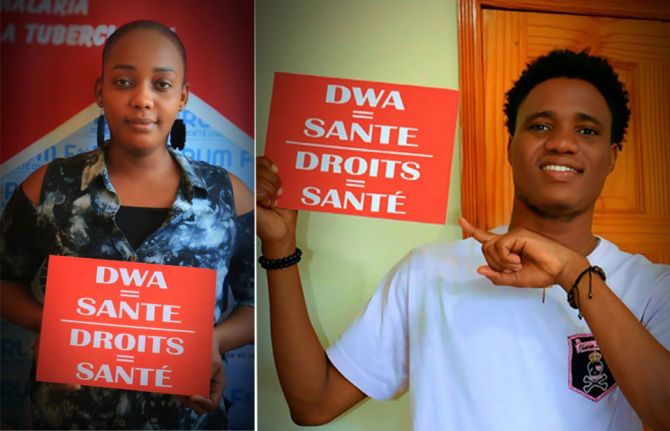

Feature Story
Empowering young women in Cité Soleil: a model for reducing vulnerability to violence in Haiti
08 August 2025
08 August 2025 08 August 2025This story first appeared in the UNAIDS Global AIDS Update 2025 report.
Gang violence in Haiti is contributing to a dire humanitarian crisis in a country where 5.7 million people face acute food insecurity and more than a million people are internally displaced, half of them children. In the country’s capital of Port-au-Prince, only 50% of healthcare facilities are operational, and access to essential health services, including HIV treatment, is severely limited. Amidst the escalating insecurity, ruthless sexual violence, including gang rape, is rampant, exacerbated by restricted or suspended gender-based violence services.
More than 6500 incidents of gender-based violence were reported in 2024, although this number is likely to be significantly underreported. Nearly two-thirds of these incidents involved rape or sexual assault. Between 2023 and 2024, there was a shocking 1000% increase in sexual violence against children.
“I was a victim of gang rape in 2021,” says 29-year-old Laguerre Myrline. “This happened when we had to abandon our home to flee the attacks of armed men. At the southern entrance of Port-au-Prince, I was assaulted by several men. They abused me one after the other. Traumatized, I didn’t even go to the hospital.”
Women and children remain particularly at risk in this crisis. The Organization for Development and Poverty Reduction (ODELPA), a civil society organization supported by UNAIDS and the United Nations High Commissioner for Refugees (UNHCR), is implementing a transformative initiative aimed at reducing sexual and gender-based violence and other systematic violence in Cité Soleil, an impoverished and densely populated commune in Port-au-Prince.
The initiative includes capacity building and economic empowerment via training on HIV prevention, prevention of gender-based violence and mental health support for girls, young women and men. Through these efforts, 180 beneficiaries have received startup funds to launch income-generating activities and businesses, helping them to break the cycle of financial dependence and offering a sustainable pathway to resilience and autonomy.
The programme has been so successful that the training sessions have been replicated for more than 1000 members of grassroots community organizations. In addition, ODELPA launched a multimedia communication campaign to raise awareness and provide education on prevention of gender-based violence.
The campaign reached more than 1.5 million people across Haiti and the Haitian diaspora through four radio programmes. The project applies a holistic approach that combines education, economic empowerment and community-driven solutions as key elements to breaking cycles of violence and inequality and ensuring girls and young women can reclaim their rights and dignity and their future.
In Haiti, the recent funding cuts have had a huge effect on the national HIV response, which was almost 100% funded externally and almost entirely reliant on PEPFAR (which provided about 90% of HIV funding) and the Global Fund (which contributed the remaining 10% of funding). Civil society organizations have been significantly impacted by the funding cuts, particularly those that provide services for people from key, priority and vulnerable populations. This has increased vulnerability to stigma, discrimination and gender inequality, and weakened responses to sexual and gender-based violence.
The youth project implemented by ODELPA and supported by UNAIDS and UNHCR is a small beacon of hope. Sustainable funding will be required to support the response to HIV in Haiti, including urgent renewed global solidarity
Global AIDS update 2025
Region/country
Related
 Impact of US funding freeze on HIV programmes in Haiti
Impact of US funding freeze on HIV programmes in Haiti

13 March 2025
 Comprehensive Update on HIV Programmes in the Dominican Republic
Comprehensive Update on HIV Programmes in the Dominican Republic

19 February 2025

